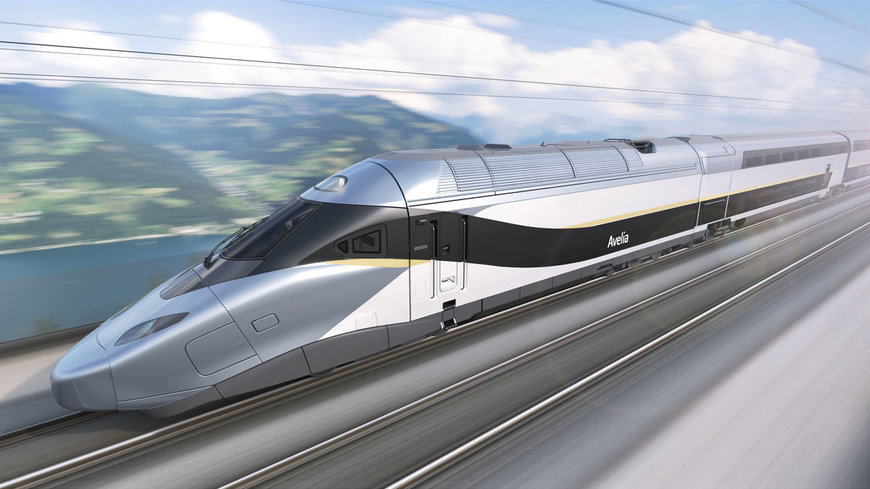railway-international.com
18
'21
Written on Modified on
Alstom’s Avelia Horizon very high-speed train wins German Design Award
Award recognizes Avelia Horizon train’s fusion of natural aesthetics with very high-speed mobility engineering

Yesterday Alstom’s Avelia Horizon very high-speed train received the prestigious German Design Award, the official design award presented by the German Design Council (Rat für Formgebung) and the German Ministry for Economics and Technology. The award recognized the Avelia Horizon’s successful marriage of advanced engineering and strong sustainability focus with inspiring organic contours and an interior design that delivers a truly exceptional passenger experience.
Speaking about this award, Laurent Jarsalé, Vice-President, Mainline Platform, Alstom, said, “The Avelia Horizon very high-speed train is Alstom’s latest iteration in a long series of successful high-speed train projects. This award-winning design is the result of close cooperation between our talented engineering, passenger experience, and eco-design and style teams that each strove to optimise the existing Avelia platform into a striking design that illustrates a fusion of natural aesthetics with environmentally-focused, very high-speed mobility.” The Avelia Horizon has a top operating speed of 350 km/h and can carry up to 740 passengers per trainset.
"This award-winning design is the result of close cooperation between our talented engineering, passenger experience, and eco-design and style teams that each strove to optimise the existing Avelia platform into a striking design that illustrates a fusion of natural aesthetics with environmentally-focused, very high-speed mobility."
Laurent Jarsalé
Vice-President, Mainline Platform, Alstom
For the project, Alstom strove to emphasise a sense of nostalgia reminiscent of the rail manufacturer’s first very high-speed trains which leveraged the use of large panoramic windscreens to express the essence of high-speed rail travel. To communicate this, designers created, or enhanced, a series of unique design elements such as implementing aerodynamic improvements to the nose to reinforce the train’s sensation of velocity and closely merging the front windscreen and lateral windows to reinforce an elegant, aerodynamic essence. Lengthening the longitudinal stretch of the headlights also helped further evoke feelings of acceleration and momentum.
Inside, equal attention was given to the passenger experience. All windows were enlarged to offer an even closer connection to the exterior landscape while the choice of smooth shapes and plush material for interior fixtures seeks to create an embracing atmosphere of comfort that leaves passengers with a sensation of inclusivity and safety.
740 passengers per trainset
350 km/h: top operating speed of Avelia Horizon
20% less energy consumed compared to the previous generation
Perhaps equally important to receiving the design award was the close attention put on meeting sustainability and efficiency goals. The Avelia Horizon addresses ambitious goals in terms of competitiveness of the rail sector and profitability: maintenance costs will be more than 30% lower and thanks to its aerodynamic design and a more efficient traction drive, Avelia Horizon will consume 20% less energy compared to the previous generation and achieve the lowest total cost of ownership per seat on the market for a train of its type.
The German Design Award celebrates its tenth anniversary in 2021. The top-class international jury honours ground-breaking design achievements, making the most modern and powerful design trends visible across all sectors. More info: https://www.german-design-award.com/en/the-winners/gallery/detail/40462-avelia-horizon-very-high-speed-train.html
Eleven of Alstom's 17 French sites are involved in the development and manufacture of this train:
Belfort, for the power cars
La Rochelle, for the project management, as well as the design and assembly of the passenger cars
Villeurbanne, for the on-board computerised systems
Ornans, for the engines
Le Creusot, for the bogies
Tarbes, for the traction chains
Toulouse, for the electrical components
Petit-Quevilly, for the traction transformers
Saint-Ouen, for the signalling and design
Reichshoffen, for the crash system studies
Valenciennes, for the interior elements’ studies.
Alstom™, Avelia™ and Avelia Horizon™ are trademarks of the Alstom Group
www.alstom.com

